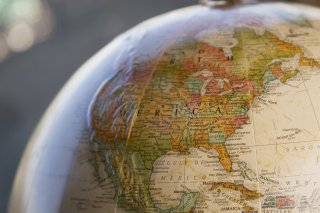Realists Have Problems with Realism
A furor over a recent article highlights an uncomfortable truth: American realists demonstrate remarkable and unexpected blindness in their views.
But on the more abstract, possibly metaphysical layer, Kyeyune is indicating that attempts to invoke America’s transcendental purpose and self-conception—that of a promised land that takes care of itself through realist means—are at odds with realist assessments of the current situation. How can America be, or return to be, a self-focused promised land with a realist foreign policy if it is so fundamentally dysfunctional and internally divided now, at the supposed height of its political, military, economic, and ideological power? Attempting to invoke the “magic” of America to justify the defense of Taiwan, as Colby does, falls flat: a not-insignificant number of Americans will not see—and more importantly, not feel—how fighting China an ocean away will help in that regard. Just as how Berlin Wall soldiers couldn’t be roused to defend the checkpoints, for the whole Soviet system was an open farce at that point, Americans won’t be roused to man the trenches of Taipei; they don’t believe in the supposed holy mission of America anymore.
Kyeyune is very pessimistic and fatalistic about the United States’ prospects—a doomer, to use the popular online term. But his assessment of America’s present material circumstances is not exaggerated. How can the United States, for example, pretend that it will be able to reorient its political and military might toward confronting China in Asia—an entire ocean away—if it can’t even audit its existing military assets, its Navy is in dire straits, defense supply chains are a bloody mess, and there are still other concerns in Ukraine, the Middle East, Africa, and so on, to say nothing of America’s southern border? This is without factoring in the country’s fragile and recession-bound economy, worrisome debt situation (especially in commercial real estate, which will hit the financial system hard through banks), and more.
Reality Comes for the Realists
In the Amazon television series Foundation (loosely based on the Foundation series of stories by Isaac Asimov), a genius mathematician, Hari Seldon, uses hyper-advanced statistics and modeling to foresee the collapse of the Galactic Empire. Emperor Cleon and his security forces consider Seldon’s proclamations to be a direct threat to the empire’s security and stability, putting a hard-won peace at risk. The empire’s fears are only heightened after a dramatic and devastating terrorist attack—totally not an allusion to the 9/11 attacks, what are you talking about—which results in the emperor exiling Seldon and his followers to the far side of the galaxy. Yet in the years that follow, signs of imperial decline become apparent: mounting costs, domestic insurrection, religious exhortations, and rebelling vassal states. Cleon turns to his own mathematicians for reassurance:
Head Mathematician: “We believe the predictive models of Hari Seldon to be counterfactual.”
Emperor Cleon, after clapping his hands, seeming relieved: “And you believe this… why?”
Head Mathematician: “In the thirty-five years since Seldon uttered his heretical proclamations, the Imperium has expanded, rather than contracted, by every critical metric.”
The mathematicians, in short, are less than helpful: they simply cannot understand Seldon’s math, his modeling, his worldview, and insist that everything is fine despite blatantly obvious evidence to the contrary. Moreover, they are afraid to admit their failure to the emperor and are visibly intimidated (if not terrified) of him. Cleon is left immensely frustrated; he senses his empire is slowly collapsing, but can’t quite grasp why, or accept—as Seldon argued—that he himself is part of the problem.
Contemporary American realists—or at least those realists that are vocal and politically active right now—are not quite the imperial mathematicians, but are equally afraid of uttering “heretical proclamations” that could see them exiled from the imperial capital. After all, exile means a loss of power and influence, and then who would be left to do what must be done? Certainly not the internationalists who got us into this mess. But it is practically impossible to tackle the critical and mounting problems of the day without openly addressing the reality that the empire, such as it is, is not what it once was.
This, I would hazard, is Kyeyune’s real critique of Colby and other realists: that not only is the United States collapsing as an imperial power, with all that implies, but her realists are not recognizing it. This is either because they don’t see it or because they fear doing so openly is an act of political suicide in Washington DC. Not only that, but accepting the premise of imperial collapse—i.e., the end of the Western-led liberal international order—means that a great number of contemporary policy debates are rendered moot. The life’s work of too many academics, theoreticians, think tank wonks, writers, and others are at stake.
Yet if Kyeyune’s diagnosis—and he is far from the only one who holds this view—is correct, or is anywhere close to correct, then realists ought to be the ones grappling with it. This will require confronting diabolically hard and politically sensitive questions. How do we communicate to the American people that they could be facing a permanent increase in the cost of living? What items can and must be cut from a significantly reduced national budget? Which of America’s strategic interests—those that are strictly necessary to preserve and enhance the well-being of American citizens in a free, democratic, and secure republic—take priority over others? Which international alliances and partnerships can be maintained, and which can’t?
None of these questions, and others like them, have easy answers. But realists are the best placed to tackle them. They should probably start doing so.
Carlos Roa is the Executive Editor of The National Interest.
Image: Shutterstock.

